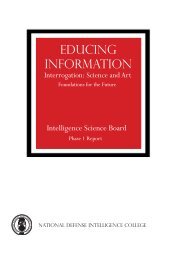COURTING A RELUCTANT ALLY - National Intelligence University
COURTING A RELUCTANT ALLY - National Intelligence University
COURTING A RELUCTANT ALLY - National Intelligence University
- No tags were found...
Create successful ePaper yourself
Turn your PDF publications into a flip-book with our unique Google optimized e-Paper software.
possesses complementary capabilities, 341 it is in practice a highly complex process.A state must determine its “potential partner’s reliability, stability, andpotential durability,” and must work out how the intelligence will be exchanged,the limits of that exchange, and what security protocols will be enacted to protectthe information provided. 342 A country cannot assume that another governmentoperates in the same way and must correctly ascertain the factors and individualswho truly influence policy before beginning the negotiations necessary to effectthe exchange. 343The most serious risk in intelligence sharing may be the exposure of sourcesand methods, but there are other potential dangers to sharing intelligence. Theseinclude the chance that intelligence given to one country will find its way to athird, potentially hostile, state; a propensity for circular reporting; increased pressureto share intelligence in other areas; and the risk that disclosure of the intelligencesharing could be politically harmful to the governments engaged in theexchanges. 344 The potential benefits of exchange are significant, however. Thelargest benefit is that intelligence cooperation can provide needed intelligencethat may be unobtainable otherwise. Cooperation may expand a country’s readilyavailable collection targets, or it may be a way to employ collection technologiesthat would otherwise be unavailable to one of the exchange partners. 345 Anothermajor benefit may be in the area of influence. A state may provide intelligence toanother country in the hope of influencing that country to act in a certain way.Cooperation may also be used as a way to engage another state diplomatically ina situation where no strong diplomatic ties exist. 346As in the post-Cold War period, the U.S., in the 20th century interwar timeframe,experienced a multiplicity of new threats at a time when the resourcesdevoted to intelligence were declining. This produced a situation whereby intelligenceexchange had to be considered by resource managers as the most efficientand effective means of addressing these requirements. 347 In one observer’sview, during periods of heightened crisis, the American public is much morewilling to tolerate associations that would be questionable during a more stable341Gideon Doron, “The Vagaries of <strong>Intelligence</strong> Sharing: The Political Imbalance,” InternationalJournal of <strong>Intelligence</strong> and Counterintelligence 6, no. 1 (Summer 1993): 135.342 Doron, 135.343Doron, 141-142.344 Jeffrey T. Richelson, “The Calculus of <strong>Intelligence</strong> Cooperation,” International Journal of<strong>Intelligence</strong> and Counterintelligence 4, no. 3 (Fall 1990): 315-318.345 Richelson, 311-315.346 Richelson, 314-315.347 James J. Wirtz, “Constraints on <strong>Intelligence</strong> Collaboration: The Domestic Dimension,” InternationalJournal of <strong>Intelligence</strong> and Counterintelligence 6, no. 1 (Spring 1993): 86.94
















